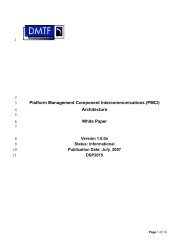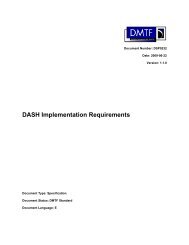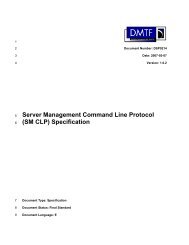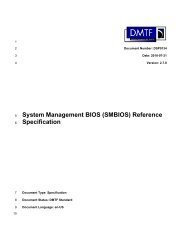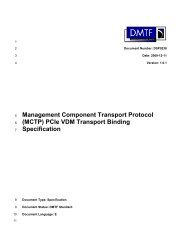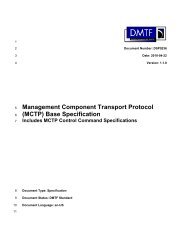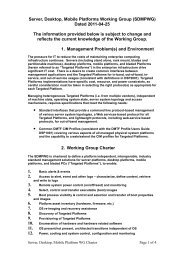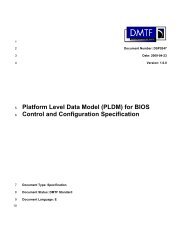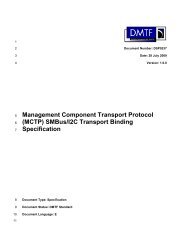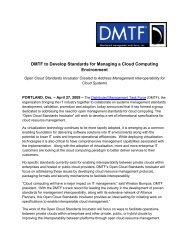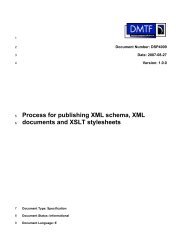ASF Specification v2.0 DSP0136 - DMTF
ASF Specification v2.0 DSP0136 - DMTF
ASF Specification v2.0 DSP0136 - DMTF
Create successful ePaper yourself
Turn your PDF publications into a flip-book with our unique Google optimized e-Paper software.
Alert Standard Format (<strong>ASF</strong>) <strong>Specification</strong> <strong>v2.0</strong><br />
<strong>DMTF</strong> Document <strong>DSP0136</strong><br />
Data<br />
Byte(s)<br />
Field<br />
Description<br />
1 Status Code Identifies the status of the previous message. If the previous message<br />
generated an error, then only the Status Code, Reserved, and Mgt Console<br />
Session ID fields are returned. See 3.2.3.5.1 for the status codes defined for<br />
this message.<br />
2-4 Reserved Reserved for future definition by this specification, set to 000000h<br />
5-8 Mgt Console<br />
Session ID<br />
9-24 Managed<br />
Client<br />
Random<br />
Number<br />
25-40 Managed<br />
Client<br />
GUID<br />
41-<br />
variable<br />
Integrity<br />
Check<br />
Value<br />
The Mgt Console Session ID specified by the RSSP Open Session Request<br />
(83h) message associated with this response.<br />
Random number selected by the managed client.<br />
The Globally Unique ID (GUID) of the Managed Client. This value is<br />
specified by the client system’s SMBIOS implementation. See 4.2.1 System<br />
Information (Type 1) for details.<br />
An integrity check value over the relevant items specified by the RAKP<br />
algorithm for Message 2 (see page 30). The size of this field depends on<br />
the specific algorithm that was selected when the session was created.<br />
3.2.4.15 RAKP Message 3 (C2h)<br />
A management console sends this RAKP message to a managed client in response to the receipt<br />
of an RAKP Message 2 (C1h). Once it validates RAKP Message 2, the management console<br />
creates a Session Integrity Key using the values specified by the RAKP algorithm (see page 31).<br />
The management console then computes an Integrity Check Value over the values specified by<br />
the RAKP algorithm, and sends that along with the Managed Client Session ID (sent by the<br />
managed client on the previous RMCP Open Session Response message) to the managed<br />
client.<br />
After receiving RAKP Message 3, the managed client verifies that the Managed Client Session ID<br />
is active and then validates the Integrity Check Value. If the Integrity Check Value is valid, the<br />
managed client creates a Session Integrity Key using the values specified by the RAKP algorithm<br />
(see page 31). With the shared Session Integrity Key in place, integrity protected messages can<br />
now be exchanged between the management console and the managed client.<br />
The format of an RAKP Message 3 message’s Data section is as follows:<br />
Data<br />
Byte(s)<br />
Field<br />
Description<br />
1 Status Code Identifies the status of the previous message. If the previous message<br />
generated an error, then only the Status Code, Reserved, and Managed<br />
Client Session ID fields are returned. See 3.2.3.5.1 for the status codes<br />
defined for this message.<br />
2-4 Reserved Reserved for future definition by this specification, set to 000000h<br />
5-8 Managed<br />
Client<br />
Session ID<br />
9-<br />
variable<br />
Integrity<br />
Check<br />
Value<br />
The Managed Client’s Session ID for this session, returned by the client on<br />
the previous RSSP Open Session Response (44h) message.<br />
An integrity check value over the relevant items specified by the RAKP<br />
algorithm for Message 3. The size of this field depends on the specific<br />
algorithm that was selected when the session was created.<br />
<strong>DSP0136</strong> 23 April 2003 Page 43 of 94



